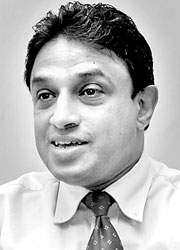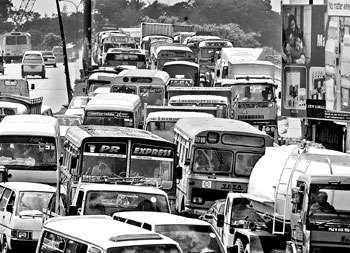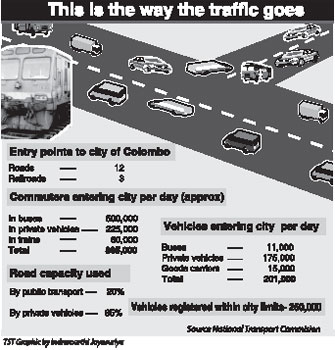
Tackling traffic!A string of measures, some radical, are in the pipeline to minimize fuel consumption in the face of skyrocketing prices. Some of the proposals include minimizing the number of commuters and vehicles entering the city, reducing the number of schooldays, working days, introducing car-free days in Colombo city and the conversion of three wheelers into gas. The Sunday Times learns that some of the plans are ready for implementation, while others are being discussed. According to Transport Ministry sources studies have shown that the most amount of fuel is wasted during traffic congestions, especially in town areas in the Western Province. According to Transport Minister Dulles Allahaperuma, Sri Lankans waste Rs. 30, 000 million worth of fuel during traffic congestions alone annually. He said this was equivalent to the cost incurred by the government on paying Samurdi allowances for all its beneficiaries (50% of the population) over a three year period.
"This is the first time we are looking at other means to defuse the fuel crisis other than increasing the price," he said. At this week's cabinet meeting the President had called on ministers to submit proposals on ways to cut down fuel consumption. Studies have shown that one of the main reasons for traffic congestion and over-consumption of fuel was due to 175,000 private vehicles entering Colombo city on a daily basis."If we can reduce this number by at least 50,000 it would reduce the congestion on the roads," Prof. Amal Kumarage, National Transport Commission chief said. One of the large scale proposals aimed at attracting at least 20% of this number to public transport is the park and ride system said the minister, adding however that it would be a difficult task. According to authorities plans are now under way to implement this project by August 1 beginning with Katubedda. A land belonging to the Sri Lanka Transport Board with a capacity to park about 500 to 600 vehicles has been allocated for the project and discussions with private transportation companies are now underway to select an appropriate service provider. The proposal was a result of an intensive study conducted by the Transport ministry and other experts in the field. The Ministry is planning to introduce the park and ride system on six of the main roads leading to Colombo – Negombo, Battaramulla Thalangama, High Level, Piliyandala, Galle and Kelaniya Roads. The Katubedda park and ride project would be the model for the other projects. The authorities are not planning to introduce large carriers for the service and believe that local companies are capable of providing efficient transportation. The buses will be small with a carrying capacity of about 20 passengers each. They believe the smaller buses would be more effective as they could ply on narrow roads as well. "We will design the system and I'm confident the local entrepreneurs are capable of handling it. We will not need any foreign expertise for this venture," Mr. Kumarage said. The treasury has allocated Rs. 50 million for the design and implementation of the proposal. Authorities claim the cost in implementing such a system was insignificant compared to the benefit it would provide. According to Mr. Kumarage any capital expenditure would be easily recovered from the end user. "A person who comes in a car should be given that same comfort in the bus if we are to attract them to a service like this. They would not like to travel in the kind of public transport that we have. We are planning to operate a luxury bus service. In other words the park and ride system will not be just another bus service. Only those who park their vehicles in the park would be eligible to use this shuttle service. It should be highlighted that this is not a service provided for the ordinary people," he added. Mr. Kumarage said the service would only be a fraction of the cost of driving to work every day. One would be able to save 75% of the cost incurred on traveling in one's own vehicle to the city daily. According to Prof. Kuamrage there are multiple benefits in a system like this. The passenger does not have to go through the stress of driving into the city daily; he/she will save on the fuel cost and would not have to go through the hassle of finding parking places in Colombo city on reaching his/her destination.
However, the system will have its share of shortcomings as well. The commuter will not be dropped at his/her exact destination, which is a major plus point of driving ones own vehicle. Until the government introduces a sub shuttle service within the city limits the commuters of the park and ride system will have to rely on public transportation system or three wheelers to get to their exact point of destination. In addition to questions arising from departure times, to cost effectiveness of the operation, security on these buses would be a major concern of these commuters who otherwise would have travelled in the safety of their private vehicles. While admitting that security would be a major drawback Prof. Kumarage however was optimistic that initial fears would be overcome if the service runs efficiently at all levels. The Minister too has assured that necessary steps would be taken to ensure that the commuters will not be exposed to any security threat."We will adopt strict measures to ensure safety. The passengers would be monitored and a token will be issued to every person. Unlike in public transportation we will be able to carry out security checks to ensure the safety of the passengers as numbers would be limited in each bus" Minister Allahaperuma said. The frequency of the departure of buses from the car park will be decided once the system is in place. However Mr. Allahapperuma said that all steps will be taken to ensure that the commuters of the service will not have to wait for more than 10 minutes at the park. "These measures have been there from 1970 in some countries like Singapore. We have characteristics similar to Singapore so it should not be difficult to adapt to a system like this. We are 40 years behind. We should implement this at least now" Prof. Kumarage said. Meanwhile private owners will have the option of driving their vehicles into the city at a premium price. As the fuel consumption doubles during the peak hours, the government hopes to encourage people to avoid peak times if they opt to travel in their private vehicles. The government is also planning to introduce a minimum number of passengers per vehicle entering the city. Surveys have shown that many vehicles entering the city only carry one or two people. Authorities are looking at options to limit this type of incidents by introducing a minimum occupancy level where owners will have to carry more passengers if they opt to drive into the city. Prof. Kumarage is of the opinion that this measure will reduce the number of vehicles entering the city. The National Transport Commission has also identified three main areas–Town Hall and Union Place, Pettah and World Trade Centre area, and Navam Mawatha where traffic density is the highest in Colombo during peak hours. 8000 vehicles come to Navam Mawatha alone. Possibilities of introducing shuttle services in and out of these areas are also being looked into Prof. Kumarage added. "We are trying to find out the origin- destinations of these vehicles and then introduce a transportation service at these posints," he said. Prof. Kumarage added that tough measures may have to be adopted if the public shows reluctance to comply.
Among other options proposed by the Transport Commssion on reducing fuel consumption include the introduction of flexible office hours which would reduce traffic during peak hours."There are organizations that are able to implement the system without incurring any losses and we hope companies in the private sector will look at this favourably and opt to implement it," Prof. Kumarage said. Car pools is another alternative he said. If private vehicle owners opt to car pool it would effectively reduce consumption of fuel as the number of vehicles entering the city would be less as about five people would use one vehicle instead of five," he said. But, under the prevailing security situation these moves are unlikely to draw favourable responses. Another proposal under consideration by the government is to convert the three wheelers to run on gas. There are 310,000 three wheelers in the country which provide transportation services to 4% of the country's commuters. This will effectively save 40% of the fuel cost spent on an average three wheeler. This is also viewed as an environmentally friendly move as the two stroke three wheelers are known to be hazardous to the environment. The conversion will cost around Rs. 25,000 per vehicle and the government is weighing the possibilities of providing this service free of charge or through a soft loan. However, the effectiveness of such a move is questionable as only the three wheel owners living in the city limits will have access to gas stations."In addition to this research is being done to assess the viability of converting buses that are operating in the city to run on gas," Mr. Allahaperuma said. The transport ministry has also proposed to introduce teleconferencing facility in government administered offices to reduce visits to Colombo offices to only once a month. The secretary to the ministry of Public Administration and Home Affairs D. Dissanayake said that a study is being carried out to assess the viability of this option of teleconferencing. Further the Transport Ministry has also suggested that the government give an allowance to public servants instead of a vehicle to encourage them not to use vehicles but to use the public transportation. The ministry also plans to introduce more school buses to reduce school time traffic. According to Allahaperuma over thousand school buses are required. However only 350 buses are available. "I plan to increase this number to 600 by the end of this year and this will also help to reduce fuel consumption," he said. There are also plans to improve train services."We have introduced first class in the intercity trains between Colombo and Kandy. We will do this on the slow train Ruhunu Kumari as well. It is comfortable and similar to going in one's own vehicle. These carriages are booked on every run," Mr. Allahaperuma said. Apart from all the quantitative measures taken by the government the minister said that there should be a change in the attitude of the people and their fuel consumption patterns. However it is interesting to know what measures would be taken to reduce the use of state vehicles, particularly those used by ministers, heads of departments and corporations. What the transport experts say Transport and logistics experts are sceptical about some of the proposals suggested for creating a more fuel-efficient system for the country. One such proposal is to create car and ride parks for vehicles entering the city. “It’s a good concept, but I wonder if it will work,” said Professor Saman Bandara, head of the department of Transport and Logistics Management, University of Moratuwa. “I doubt people will be willing to leaving their vehicles in unknown places and take a risk. I cannot see people embracing such a system, even if sanctions are imposed on vehicles entering the city.” Another proposal is to reduce the number of school days and working days, and thus reduce the amount of fuel used to transport employees to work and students to school. This proposal too has not been favourably received. “Reducing the number of school days from five to four may be fuel-efficient but it is not practicable. Students may not be able to handle the extra-long hours that will inevitably follow with a four-school-days schedule,” Prof. Bandara said. A shorter work week would work only if employees were evaluated under a task-based system, rather than a time-based system that counted working hours. “The flexible-hours concept is good only if you used a task-based evaluation. If not, productivity may go down,” Prof. Bandara said. Rohan Abeywickrama, former chairman of the Chartered Institute of Logistics and Transport, believes cutting down on the number of school days and working days would be counter-productive. “As it is, Sri Lankans don’t work enough,” he said. “If we reduce the number of work days, productivity will decline, and that will not be good for the economy.”The experts say the government should educate and encourage the public to adopt a more fuel-efficient lifestyle, while introducing fuel-efficient measures. |
|
||||||
|| Front
Page | News | Editorial | Columns | Sports | Plus | Financial
Times | International | Mirror | TV
Times | Funday
Times || |
| |
Reproduction of articles permitted when used without any alterations to contents and a link to the source page.
|
© Copyright
2008 | Wijeya
Newspapers Ltd.Colombo. Sri Lanka. All Rights Reserved. |


